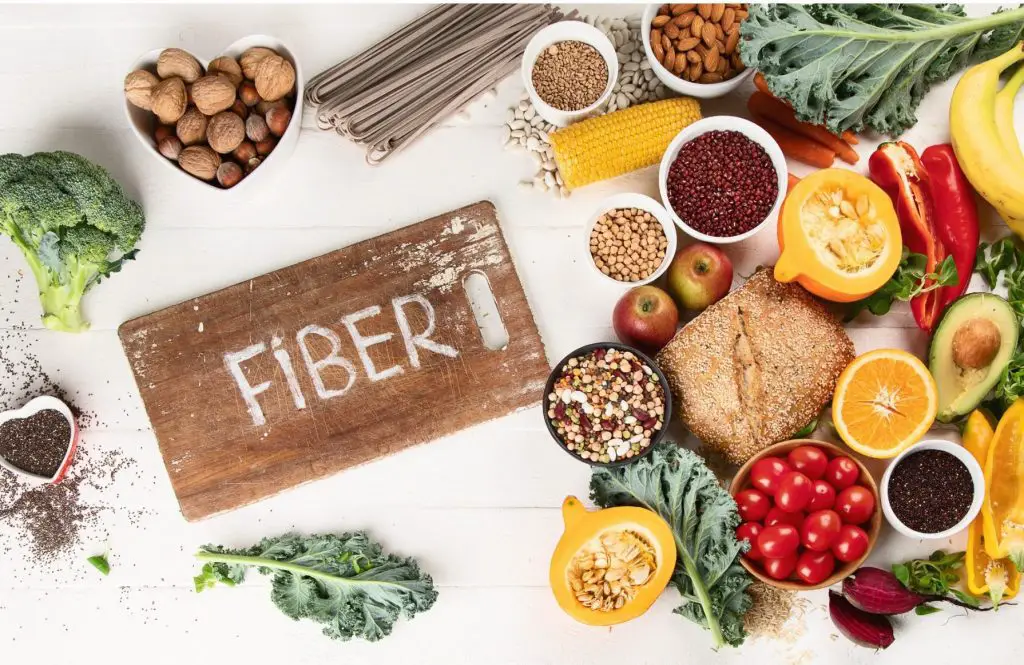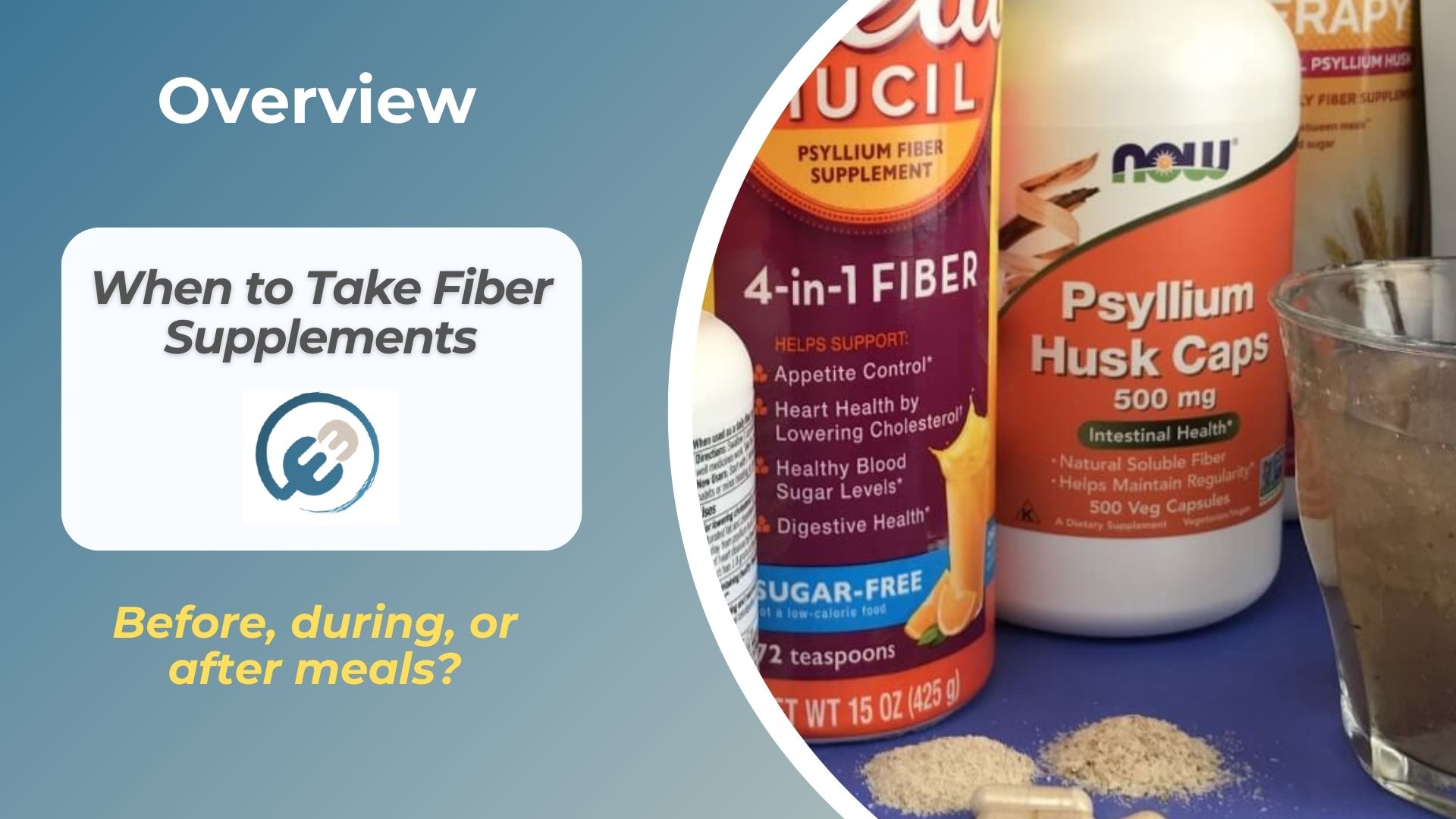Just about everyone could benefit from increasing their fiber intake, but sometimes it’s just not possible to get enough from diet alone. That’s where fiber supplements come in.
Most people know that fiber is important for overall health, but they don’t know when the best time to take a fiber supplement is.
That’s why we’ve put together this blog post to help you make an informed decision about when to take fiber supplements.
Two Types of Fiber Supplements
There are two main types of fiber supplements: soluble and insoluble. Together these are known as your total fiber content.
Soluble fiber dissolves in water and forms a gel-like substance in the gut, which helps slow down digestion and can promote feelings of fullness. Insoluble fiber, on the other hand, does not dissolve in water and helps add bulk to the stool, which can aid in constipation relief.
Most fiber supplements contain a mix of both soluble and insoluble fiber to best promote digestive health.
When to Take Fiber Supplements
As for when to take fiber supplements, that really depends on your goals. If you’re looking for constipation relief, it’s best to take them before meals so they can start working right away.
If you’re trying to increase feelings of fullness or lose weight, you might want to take them with meals or immediately after eating. And if you’re just looking to up your overall fiber intake, any time of day should do the trick.
Constipation Relief
If you’re struggling with constipation, you’re not alone. It’s a very common issue, and there are a variety of ways to find relief. One popular option is to take fiber supplements. Fiber absorbs water and bulk up stool, making it easier to pass.
And if you take it before meals, it can start working right away. That way, your food won’t get in the way of the fiber doing its job.
Of course, everyone is different and what works for one person may not work for another. But if you’re looking for constipation relief, it’s worth giving fiber a try. You might be surprised at how effective it can be.
Weight Loss or Fullness
Fiber is an important nutrient that many people are lacking in their diets. It has a variety of health benefits, including being correlated with a healthy weight range and increased feelings of fullness.
When trying to lose weight or increase feelings of fullness, it’s best to take fiber supplements with meals or immediately after eating.
Fiber makes you feel fuller longer, so it can help prevent overeating. It also slows down the rate at which food moves through your digestive system, which can help decrease calorie absorption. You may also want to try fiber before meals as well, so there’s plenty of time for it to absorb and keep you full.
Just be sure not to overdo it, as too much fiber can cause bloating and gas. By incorporating more fiber into your diet, you can enjoy all of its benefits! Read more about Why Am I Eating So Much And Not Getting Full?.
Colonbroom has gained recognition as a valuable tool for weight loss due to its unique properties and benefits. With its ability to support healthy digestion, regulate bowel movements, and promote detoxification, Colonbroom can contribute to effective weight management and help individuals achieve their weight loss goals.
Overall Fiber Intake
If you’re just looking to up your overall fiber intake, any time of day should do the trick.
How Much Fiber Do I Need Per Day?
Dietary fiber is an essential nutrient that most people don’t get enough of. The recommended daily intake for fiber is 25 grams for women and 38 grams for men, but the average American only consumes about 15 grams per day.
One easy way to increase your fiber intake is by taking supplements. However, the best way to increase your fiber intake is by eating more foods that contain fiber.
Should you take fiber supplements in the morning or at night?
There are a few things to consider when deciding whether to take your fiber supplement in the morning or at night. If you have trouble with constipation, taking your supplement in the morning may help to move things along more quickly.
On the other hand, if you find that fiber supplements give you gas or bloating, it may be better to take them at night so that you’re not uncomfortable during the day.
Ultimately, it’s a matter of personal preference and what works best for your body. If you’re not sure, start by taking your supplement with breakfast and see how you feel. You can always adjust your timing as needed.
Should fiber supplements be taken before or after meals?
If you’re looking for constipation relief, it’s best to take them before meals so they can start working right away.
If you’re trying to increase feelings of fullness or lose weight, you might want to take them with meals or immediately after eating. And if you’re just looking to up your overall fiber intake, any time of day should do the trick.
However, keep in mind that too much fiber can cause bloating and gas, so it’s important not to overdo it. Start slowly and increase your intake gradually as your body adjusts. By incorporating more fiber into your diet, you can enjoy all of its benefits!
Should I take fiber on an empty stomach?
There’s no right or wrong answer to this question. Some people find that taking fiber on an empty stomach helps them regulate their bowels better, while others find that it gives them gas and bloating.
Ultimately, it’s a matter of personal preference and what works best for your body. If you’re not sure, start by taking your supplement with breakfast and see how you feel. You can always adjust your timing as needed.
Fiber Rich Foods

Most people don’t get enough fiber in their diet, which can lead to constipation, digestive problems, and other health issues.
As mentioned above, there are two main types of dietary fiber: soluble and insoluble. Both types of fiber are important for gut health, but soluble fiber is especially beneficial as it helps to slow down digestion and regulate blood sugar levels.
While you can get soluble fiber from foods like oats, peas, and beans, insoluble fiber is found in foods like wheat bran and vegetables. The best way to increase your fiber intake is to eat a variety of high-fiber foods throughout the day. This will not only help to keep your digestive system functioning properly, but it will also help you to feel full and satisfied after meals.
Great food means great nutrition, price, availability, and taste. In terms of eating more fiber rich foods, here are a few good ideas to start!
1. Beans
Beans are a great source of fiber, and they’re also relatively inexpensive and widely available. They’re also quite versatile, as they can be used in a variety of dishes. While some people find beans to be unpalatable, there are many ways to prepare them that can make them quite delicious.
However, if you have an odd craving for beans you may want to read here Why Am I Craving Beans So Bad? Top 11 Reasons.
2. Lentils
Lentils are another great source of fiber, and they have many of the same benefits as beans. They’re also relatively inexpensive and widely available. Like beans, lentils can be used in a variety of dishes, and they can be quite delicious when prepared properly.
3. Oats
Oats are a great source of fiber, and they’re also relatively inexpensive and widely available. They’re also quite versatile, as they can be used in a variety of dishes. Oats are typically quite palatable, although some people may find them to be bland.
4. Quinoa
Quinoa is a great source of fiber, and it’s also relatively expensive and widely available. It’s also quite versatile, as it can be used in a variety of dishes. Quinoa is typically quite palatable, although some people may find it to be bland.
5. Barley
Barley is a great source of fiber, and it’s also relatively inexpensive and widely available. It’s also quite versatile, as it can be used in a variety of dishes. Barley is typically quite palatable, although some people may find it to be bland.
6. Brown rice
Brown rice is a great source of fiber, and it’s also relatively inexpensive and widely available. It’s also quite versatile, as it can be used in a variety of dishes. Brown rice is typically quite palatable, although some people may find it to be bland.
Conclusion:
Increasing your dietary fiber intake is a great way to improve gut health, promote feelings of fullness, and aid in weight loss. There are many more benefits as well from lower cholesterol, to minimizing the risk of heart disease, irritable bowel syndrome, and colon cancer.
So definitely be sure to eat more high fiber foods, and get fiber daily, because a high fiber diet really is the answer here.
But sometimes diet alone just isn’t enough. That’s where fiber supplements come in. But with so many products on the market, it can be tough to know which one is right for you—and when to take it. Use this guide as a starting point for finding the right supplement for you and incorporating it into your daily routine.
If you want more info about supplements and vitamins, including how to read labels, myths and more – read our ultimate guide for beginners who want to start taking supplements and vitamins.



